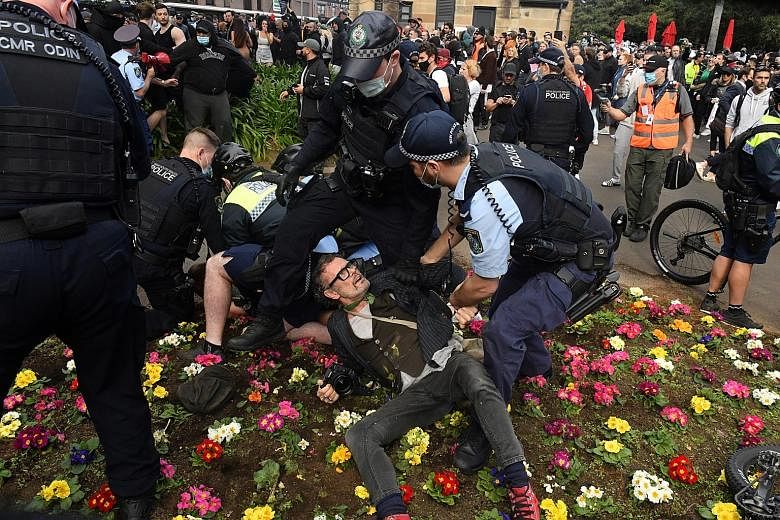MELBOURNE • New South Wales in Australia yesterday logged its second-highest daily rise in locally acquired Covid-19 cases of the year amid fears of a wave of new infections after thousands of people joined an anti-lockdown protest.
"In relation to yesterday's protests, can I say how absolutely disgusted I was. It broke my heart," Ms Gladys Berejiklian, the premier of the country's most populous state, told reporters. "I hope it won't be a setback, but it could be."
There were 141 Covid-19 cases reported, down from 163 a day earlier. The new outbreak, which began in June, is being driven by the highly contagious Delta variant of the virus, and has now infected 2,081 people in New South Wales. There are 43 people in intensive care, up from 37 a day earlier.
Prime Minister Scott Morrision, who is under fire for a slow vaccine roll-out, said more vaccine supply is not going to ensure New South Wales gets out of lockdown, but that what is needed is an effective, properly enforced lockdown.
"Let me be clear - there's not an alternative to the lockdown in New South Wales to get this under control. There is no other magic bullet that's going to do that," Mr Morrison said at a televised conference. He called the anti-lockdown protests in the state capital Sydney reckless and self-defeating.
While Ms Berejiklian and other state leaders have blamed the federal government in Canberra for the slow vaccine roll-out, critics have said New South Wales did not enforce its stay-at-home orders, which has led to Delta variant leaks to other states. At least 38 of the new cases had spent time in the community while infectious, state health authorities said.
Numbers of such cases have stayed stubbornly high even after four weeks of lockdown in Sydney, now expected to be extended beyond July 30. The state reported two deaths overnight, including a woman in her 30s who had no pre-existing conditions.
Despite its struggle with spikes of infections, Australia has managed to keep its epidemic largely under control with a total of about 32,600 cases and 918 deaths.
To help speed up vaccinations in Sydney, the government's official adviser, the Australian Technical Advisory Group on Immunisation (Atagi), on Saturday changed its advice on the AstraZeneca vaccine, urging anyone in the city under the age of 60 to strongly consider getting vaccinated with it.
Atagi had previously advised against use of the AstraZeneca vaccine for people under 60 due to concerns about blood clots.
Mr Morrison yesterday said the government has secured an extra 85 million doses of the Pfizer vaccine, but they will only be delivered in the next two years. "To have those booster shots pre-ordered means we can go into 2022 with confidence," he said.
REUTERS

